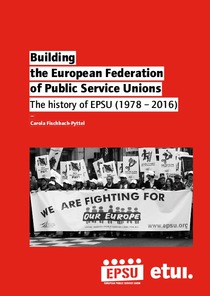Building the European Federation of Public Service Unions: the history of EPSU (1978-2016)
"The European Federation of Public Service Unions will celebrate its 40th anniversary in 2018. It is better known as ‘EPSU’ (the ‘European Public Services Union’), a change of name made in November 2015 that represents both the organisation’s mission statement and a key future ambition. This b...
| Main Author: | |
|---|---|
| Institution: | ETUI-European Trade Union Institute |
| Format: | TEXT |
| Language: | English |
| Published: |
Brussels
2017
ETUI EPSU |
| Subjects: | |
| Online Access: | https://www.labourline.org/KENTIKA-19394771124911129539-Building-the-european-Federati.htm |
| Summary: | "The European Federation of Public Service Unions will celebrate its 40th anniversary in 2018. It is better known as ‘EPSU’ (the ‘European Public Services Union’), a change of name made in November 2015 that represents both the organisation’s mission statement and a key future ambition.
This book retraces the development of EPSU, beginning with its early days as the European Public Services Committee (EPSC). The EPSC was set up as an ETUC liaison committee encompassing two organisations. It soon became obvious that this ‘marriage of convenience’ between the organisations involved was a mismatch, and it came to an end in 1994 through a decision by the EPSC Presidium which was then formalised at the fifth General Assembly in Vienna in 1996. The organisation was from then on to be called the European Federation of Public Service Unions (EPSU).
The book also looks at the difficult development of the sectoral social dialogue in the public services sector and describes the problems that had to be overcome in this process.
A constant challenge in EPSU’s work has been the various waves of public service liberalisation, ranging from public procurement and the Services Directive to the European energy market and, recently, the negotiation of various international trade deals. All these issues raise questions about the power relations that determine the policymaking of EU institutions." |
|---|---|
| Physical Description: | 255 p. Digital Paper |

